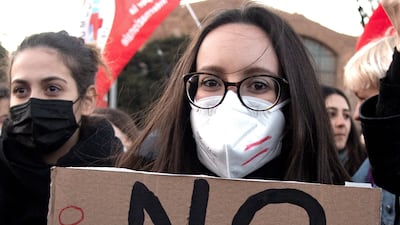Women around the world will not achieve equality with men for 131 years – by the year 2154 – with only tepid progress on persistently large gender gaps, prompting the urgent need for faster action.
The Global Gender Gap Report 2023 – released by the World Economic Forum on Wednesday – shows that 146 countries have closed 68.4 per cent of the gender gap, up just 0.3 percentage points compared with the previous report.
That slight move is down to improvement in closing the education attainment gap, with 117 out of 146 countries in the index now having closed at least 95 per cent of the gap.
The slow progress "creates an urgent case for renewed and concerted action", said Saadia Zahidi, managing director at the World Economic Forum.
"Accelerating progress towards gender parity will not only improve outcomes for women and girls, but benefit economies and societies more widely, reviving growth, boosting innovation and increasing resilience."
With the challenges facing business such as climate change, inflation and technological shifts, ensuring diversity of leadership as well as staff will build resilience to cope with such a turbulent era of change.
"With the myriad challenges the world faces, we need the full power of human creativity and collaboration to find pathways to shared prosperity," Ms Zahidi said.
The annual Global Gender Gap Index benchmarks the current state of gender parity in four areas – economic participation and opportunity, educational attainment, health and survival, and political empowerment.
Parity has advanced by only 4.1 percentage points since the first edition of the report in 2006.
While the global parity score has recovered to pre-pandemic levels, the overall rate of change has slowed significantly, the report showed.
No country has yet achieved full gender parity, but the top 10 economies ranked on that list have closed at least 80 per cent of the gap.
For the 14th consecutive year, Iceland took the top position and is still the only country to have closed more than 90 per cent of its gender gap, with a score of 91.2 per cent.
The Nordic country was followed by Norway, Finland, New Zealand, Sweden, Germany, Nicaragua, Namibia Lithuania and Belgium, who have all closed at least 80 per cent of their gender gap.
For the 146 countries covered in the 2023 index, the health and survival gender gap has closed by 96 per cent, the educational attainment gap by 95.2 per cent, economic participation and opportunity gap by 60.1 per cent, and political empowerment gap by 22.1 per cent.
At the current rate of progress over the 2006-2023 span, it will take 162 years for women to achieve political empowerment, 169 years for full economic participation and opportunity, and 16 years for equal educational attainment.
The time to close the health and survival gender gap "remains undefined", the report said.
The Middle East and North Africa, with a score of 62.6 per cent, is the region farthest from gender parity.
This is a 0.9 percentage-point decline in equality since the last edition for this region, based on the constant sample of countries covered since 2006.
The UAE, Israel and Bahrain have achieved the highest parity in the region, while Morocco, Oman and Algeria rank the lowest.
The region’s three most populous countries – Egypt, Algeria and Morocco – registered declines in their parity scores since the previous edition of the report.
In the Middle East, women can expect to achieve equality with men in another 152 years.
Workforce problems
Globally, labour market conditions for women remain a big challenge.
Women continue to face higher unemployment rates, at about 4.5 per cent, compared with 4.3 per cent for men.
Even when women secure employment, they often face substandard working conditions, mainly due to more women taking informal jobs than men, the report said.
Women are also underrepresented in business leadership positions.
While they account for 41.9 per cent of the workforce in 2023, the share of women in senior leadership positions is at 32.2 per cent in 2023, nearly 10 percentage points lower than the year before, according to LinkedIn data cited by the WEF.
Women are also significantly underrepresented in the Stem (science, technology, engineering and mathematics) workforce.
They account for almost half (49.3 per cent) of total employment in non-Stem occupations, but just 29.2 per cent of all Stem workers.
When it comes to artificial intelligence (AI) specifically, talent availability overall has surged, increasing six times between 2016 and 2022, yet female representation in AI is progressing very slowly, the report said.
The percentage of women working in AI today is approximately 30 per cent, about 4 percentage points higher than it was in 2016.
Private and public sector leaders must take "collective, co-ordinated and bold action" to accelerate progress towards gender parity, igniting renewed growth and greater resilience, the report said.
“While there have been encouraging signs of recovery to pre-pandemic levels, women continue to bear the brunt of the current cost-of-living crisis and labour market disruptions,” Ms Zahidi said.
“An economic rebound requires the full power of creativity and diverse ideas and skills. We cannot afford to lose momentum on women’s economic participation and opportunity.”


